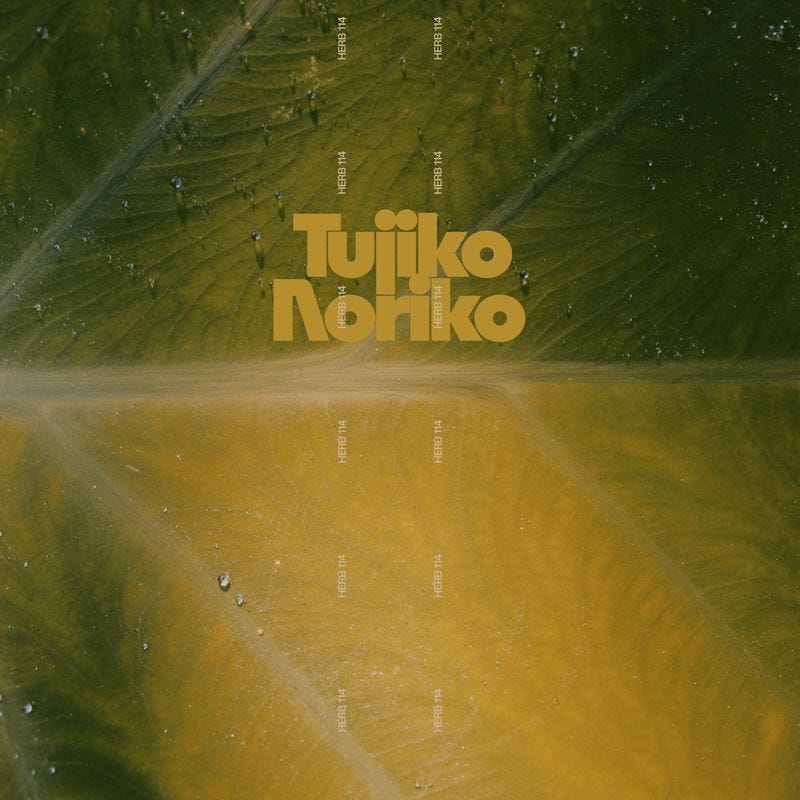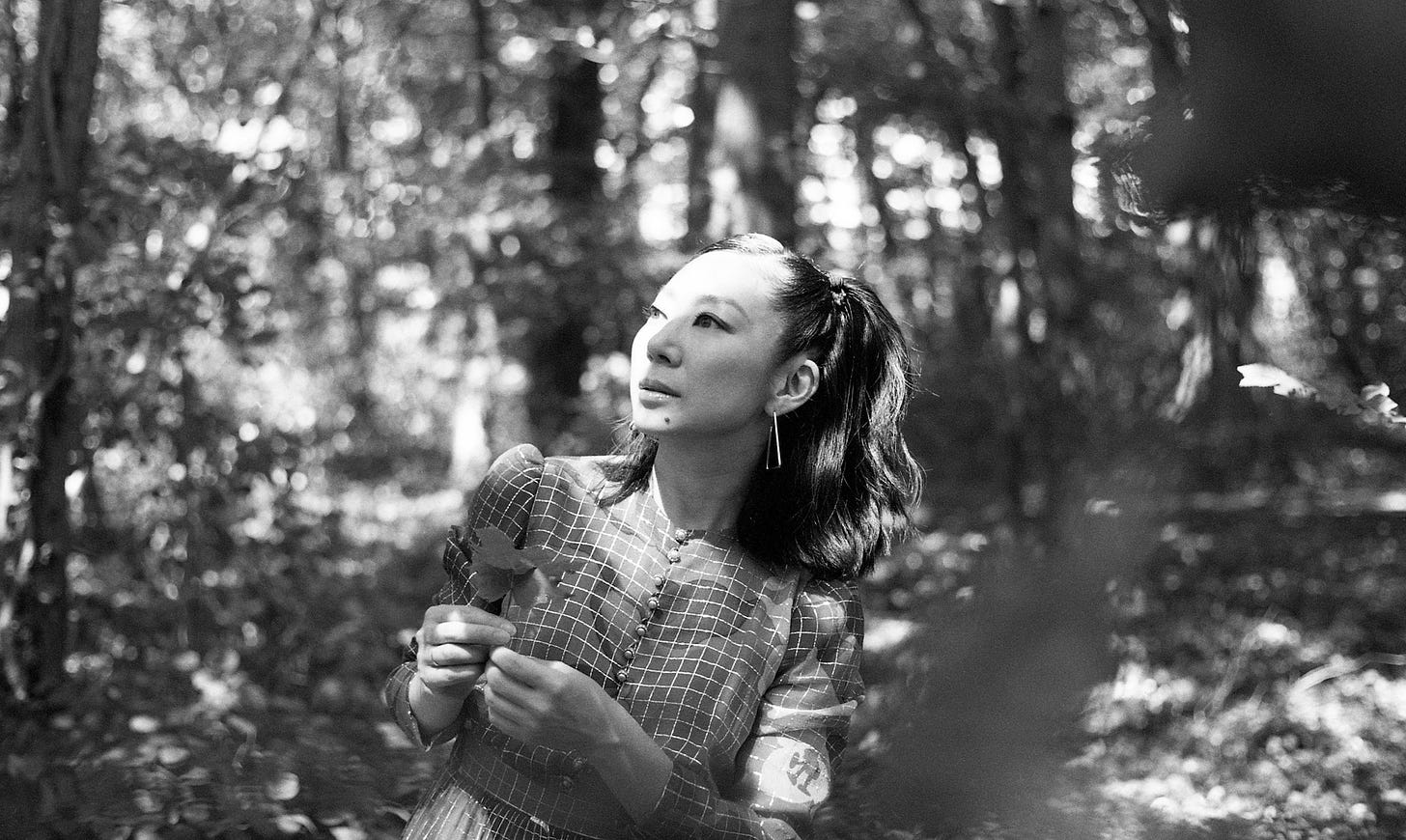Herb Sundays 114: Tujiko Noriko
The Osaka-born polymath experimental artist shows her depth and range of taste.
Herb Sundays 114: Tujiko Noriko (Apple, Spotify)
Art by Michael Cina.
“Ah, feel encouraged to listen to music and calm down to look for our cat.”
*update!: “We found her!!!! 3weeks of searching and finally I heard her voice🥹 from the basement of a closed rehabilitation center. It was a real relief. We are sooooooo happy!” - Tujiko Noriko for Herb Sundays
Tujiko Noriko (Osaka-born, now based in Vineuil Saint Firmin, France) has been a fixture in experimental music circles for over two decades and has expanded her craft to include film work, including acting, directing, and composing.
I was introduced to her music via Royal Oak, Michigan’s Neptune Records, in the early 2000s, so I was thrilled that she agreed to share a playlist, which is as charming and flummoxing as her work, split between the poles of pop and underground music. Her trademark early sound, an uncanny hybrid of pop vocals over glitchy, skeletal electronics, remains a solid-state concept that has aged very well. Closely associated with the heralded Editions Mego label, Noriko was supposedly discovered by Christian Fennesz and the late Mego co-founder Peter Rehberg, who issued her Mego debut 少女都市 (Shojo Toshi) in 2001, which seemed like a departure for the label but actually was a canny revelation of where laptop music was headed. She has since also released music on beloved labels such as FatCat, ROOM40 and PAN.
In the era just before streaming and when much of the world’s music wasn’t on YouTube, I mentally earmarked a small cache of albums and songs that couldn’t be accessed on the legal web. These were songs I had to keep the CD handy for (yes, I also ripped the mp3 too) if the mood struck. One of these songs was “Fly” off Hard Ni Sasete (Make Me Hard) (Mego, 2002), a gentle, blooming electronic tone poem that I've yet to look up the lyrical translation for all these years, content as I am with the feeling of the song as it stands. The whole album is a classic of the era, both charming and confounding, the parlance of the times for global electronics.
When googling for more notes on the record, I found a fan letter from Margeaux Labat (aka marg.mp3) (Herb 92), from a few years back, serving as a great album bio:
“on this record, tujiko noriko creates textured, multi-sensory soundscapes that give off an air of magical realism. it’s ambient and glitchy, but never chaotic. bittersweet and serene, playful, but a sense of calm always prevails.
mostly in japanese but sometimes in english, tujiko’s childlike, overdubbed vocals come and go like breathy kisses in a dream. less really is more on this album, with even the most minimal tracks still sounding expansive and layered.
saying this tends to lose its meaning when overused, but this record is truly an immersive listening experience from beginning to end. when recently seeking music that provides an escape, this album has been one of my go-tos. take note! this should be a lesson in world-building.”
Noriko’s most recent record Crépuscule I & II, released last year, has been one of her most well-reviewed albums to date (Pitchfork’s RIYL: “Land art; gentle ombre; walking through an endless hallway of books and looking for the one that will teach you to build a piano by hand”), and some of her earlier work is getting the reissue treatment, including From Tokyo to Naigara on the elegant Keplar label, all this feels like we are in another growth period for the artist. To use a cliché, the work is maturing, but not losing its charm.
Her work in film, often alongside friend Joji Koyama (Joji from Crack magazine: "We went through so many things that now it's like, 'Yeah, nothing can break us') whom she co-wrote & co-directed 2017’s Kuro has also yielded some of her most promising developments and Noriko is currently developing her 2nd feature film with him at the moment. The score for Kuro, released by the Pan label, is a sombre beauty, the work of a master or as
exclaimed in his Pitchfork review for Crepuscule I & II: This time, Tujiko hasn’t so much shaken the frame as swapped in a whole new camera. Gone are the whimsy, the crunch, the surfeit of stimuli that once made the act of listening to her music feel like sensory overload. In their place, she has summoned an hour and 46 minutes of soft, luminous ambient music of alien beauty and human warmth.What I take from Noriko’s career is a desire to evolve, and to not fear change. A simple, elegant treatise.
From a recent interview for Tokion by Tetsuya Sakamoto:
TT:–I actually feel like Shojo Toshi and Crépuscule I & II are connected, even if it may not look like it.
TN: You might be right. The equipment, studio, and whatnot differ, but I can’t help being drawn to certain sounds. Yes, I make electronic music, but I like organic sounds that blend into your skin rather than loud ones. Music is always somewhere, and I find and give form to it.
TT: –It’s been over two decades since your debut. Do you feel as though you’ve changed as a musician?
TN: It doesn’t feel like I’ve been doing it for a long time. I always feel like I’m a baby. It’s not like I’m stopping myself from growing up; it’s just that I can do so much more. I never run out of ideas and am ready to put out more songs.






